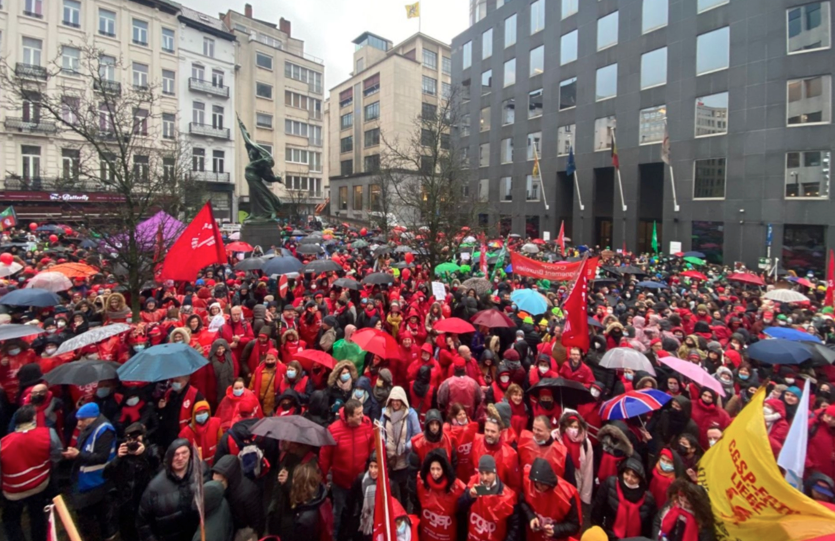Marina Kontara
Ten thousand education workers, students and parents took to the streets in Brussels on February 10, as part of an education sector strike that was organised by the French speaking trade unions of the country. The demonstration headed to the premises of the Wallonia Education Ministry demanding better conditions at schools for teachers and students. A delegation of the strikers met with the Minister and ministry officials, who nevertheless failed to promise anything more than 100€ raise per teacher over three years, as a salary adjustment that the strikers claim was long over-due (and fails to cover the rise in the cost of living workers experience).
***
In any event, their demands are much wider than a raise in salaries. The education system in Belgium has suffered from important budget cuts over at least the last 20 years, which have resulted in bad quality of infrastructure, staff shortages and a significant decrease in the quality of education offered to the pupils. Teachers tell stories about buildings falling apart, lacking heating and sufficient cleaning staff. They also report that they are obliged to work overtime in order to cover administrative tasks, as administrative staff is also lacking. While failing to hire secretarial staff, the governments have imposed longer and more complicated evaluation and administrative procedures, which of course someone has to do! If the administrative staff is not there, then it will be up to the teachers to do them.
Apart from that, the quality of education has significantly deteriorated over the past year. Many pupils’ level of knowledge is lower than what would correspond to the year-group they are in in basic courses like Maths, Physics or French; this percentage can be up to as much as 30%. Sometimes, children in the third grade of primary school fail to properly read and write. Impressive inequalities are also present: these deficiencies are way higher at schools in poor areas than in rich ones.

***
Things have become even worse during the pandemic. Health and cleaning protocols were imposed, but there were not sufficient workers to implement these protocols. At the same time, the schools have not been receiving enough cleaning material and protective equipment (masks, disinfectants, etc), so it has been impossible to implement these necessary measures. One of the strikers present at the demo talked about this in a very eloquent way:
“They tell us to open the windows, but many windows in our classrooms are broken!”.
An English teacher also said:
“When colleagues are absent because they have to quarantine or are sick, we can be found with 35 pupils in one classroom”;
it is clear that no proper lesson can be held and no covid protocol can be kept in such conditions.
***
All the above reasons are more than enough to explain why 10.000 people participated in the demonstration, while participation in the strike was also very high. It was the biggest strike and demonstration in the education sector since 2011. The participation rate was well above what the trade unions had expected.
Anger has accumulated over the years and the contradictory and controversial handling of the pandemic by the government has been the last straw. Over the past two years, schools have been opening and closing, not on the basis of the conditions they face or the situation of the pandemic, but rather depending on how urgent for the economy it was that parents go to work. Schools have actually been used as child-care spaces. According to a teacher from Brussels, at least 30% of the teachers declare that they have had enough and that they are close to burn-out.
It is also important to note that some teachers from Flanders also participated in the demonstration, even though the Flemish trade unions had not called for a strike.
***
Given the above, the teachers, administrative staff, parents and students are demanding:
- Protective equipment in order to observe the Covid protocols (masks, disinfectant, self-tests);
- Better infrastructure: improve and repair the existing buildings, but also adjust and use vacant public buildings for schooling purposes;
- A Mass recruitment drive for teachers, administrative, technical and cleaning staff; the aim should be to have no more than 15 pupils per class;
- Stop the reforms that increase the administrative burden and make financial management a priority. Instead, quality education for all should be the target of the management of the schools.
As a trade unionist said, the Ministry’s response was too poor and their demands were not heard. Therefore, there should be 20.000 school staff taking to the streets next time, and the next time should be very soon.













